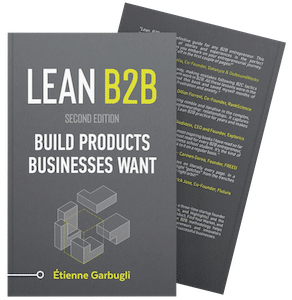Last April, B2B entrepreneur and blogger Dillon Forrest decided to quit his full-time startup efforts in spite of having another 8-months of startup runway in the bank.
His startup was in the user behaviour tracking market. It allowed businesses to replay user interactions on websites to diagnose UX mistakes or sale funnel problems.
Since Dillon mentioned that reading Lean B2B: Build Products Businesses was a factor in deciding to quit his startup. I organized a discussion with him and Steve Wood – a veteran bootstrapper who, in 2009, sold his first startup to Salesforce.com – to talk about the decision process that leads to quitting a startup.
Excerpts From the Conversation
Steve Wood (SW): 6 months is not that long to give up. I mean… very few companies would show any movement in 6 months, but I do get what you’re saying about not having the right skillset. I mean, I do think having a co-founder who compliments your skills is actually really important. I’ve never heard of anybody starting a company and actually even having a glimmer of success within 6 months.
Dillon Forrest (DF): I don’t really feel like I was actually starting a company in retrospect. I felt like I was indefinitely validating markets and indefinitely validating niches. So I think that’s why I actually pulled the plug.
SW: I remember a very, very good friend of mine (Wayne McIntyre from Psykler) I mean, I’ve known Wayne since I was a kid and he said to me: since starting your company, you’ve got a lot more grit. You’re a much grittier person than I knew before. I think yeah because I don’t take any shit anymore.
DF: You become very comfortable with uncertainty and that becomes the status quo.
SW: …to be an entrepreneur you got to be really salesy and outgoing. You’re the guy who lights up the room, you’re the guy who’s… that’s just totally bulls***. Most entrepreneurs I’ve met are actually quite uncomfortable people. A lot of them are quite socially terrible like they’re just terrible! Either they’re like narcissists or they’re incredibly introverted or they’re slightly uncomfortable or they’re super geeky or…
DF: I’m probably going to say that… if I wasn’t with her (Dillon’s girlfriend), I honestly have no idea how far I’d gone. And that’s something I don’t think anybody talks about and I might even go further to say that I think we all know people with partners who aren’t supportive at all. You know people say that if you want to start up you should have certain connections, certain credibility and a certain team that you want to build. I mean… how about your domestic life? If you don’t have a good partner, none of that other stuff even matters.
SW: The rule of an entrepreneur is oddly to make yourself redundant, which is obviously another thing somebody working in a company would never say. You don’t say my rule is to make myself redundant.
DF: I want to be one of those people who becomes obsessed with the problem and then start a business as a means to solving that problem. I mean that’s kind of the approach I want to take next time but at the time it was like: yeah I really want to start a company. I viewed entrepreneurship like a problem, like a math problem. I viewed it like a proof basically if I could dedicate a few years of my life to solving then, you know the entrepreneurship proof.
More on When to Quit Your Startup
- The Flagback Story or Why your B2B Startup Should be Lean
- Getting Out of Recruitment — The Story of B2B Startup HireVoice
- Does Your Startup’s Founding Team Stand a Chance? Here’s How to Tell…
Download the First 4 Chapters Free
Learn the major differences between B2B and B2C customer development, how to think about business ideas, and how to assess a venture’s risk in this 70-page sampler.
Working on a B2B Startup?
Join our free email course to learn all you need to know:


